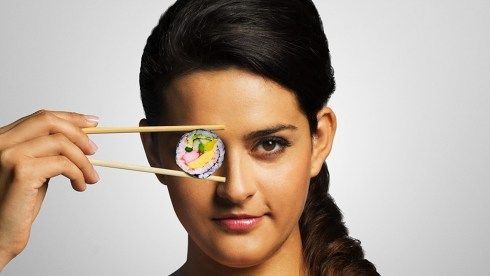
Anthony Lucero’s first feature film, “East Side Sushi,” follows the story of Juana (played by Diana Elizabeth Torres), a working-class Latina single mother who strives to become a sushi chef. The cast also includes Kaya Jade Aguirre, Yutaka Takeuchi and Rodrigo Duarte Clark, amongst others. The feel-good movie will most likely have audiences craving sushi and tacos at the same time, and will start a conversation about how certain universal languages (such as food) can break boundaries if people open their heart and minds. The film is beautifully shot and has received numerous awards and recognitions at movie festivals in California, where the movie opens September 18.
We spoke to writer-director Anthony Lucero and lead actress Diana Elizabeth Torres about the challenges faced by Latinos, and all immigrants for cultural acceptance, and how stereotypes can be broken with hard work and persistence.
Latin Times: Is there a specific reason why you chose those two specific cultures?
Anthony Lucero: Yes. Lots of reasons; I personally love both their dynamics and have never seen these cultures as leads, so I wanted to be unconventional in my story telling. Also, I chose sushi because it’s very cinematic and difficult to make; and it’s regarded as something only Asian men can do. It just had those barriers that I wanted this character to break down.
LT: But something to point out here is that it really is a cultural to not let a Latino woman make the sushi in an authentic Japanese restaurant, rather than anything else.
AL: Exactly. It’s a cultural thing and even as Americans, we’re used to walking into a sushi place and seeing Asian men preparing the food. Just like if you walk into a taquería, we could be thrown off if there were Asian men preparing the tacos. I also wanted people to think about that; what is authentic cuisine? Do you have to be born in that culture to make that food or can you learn it?
LT: And how much of your conversation is about immigrants and foreign cultures, and how much is it about feminism?
AL: Well, those are for sure the two main focuses in the story, plus the underdog factor, too. But the core is about a woman fighting to get ahead in a male dominated environment, and the immigration part of it was in the mix because I wanted to tell a story about people we don’t often recognize in cinema. I wanted to turn the cameras towards those people that are working in the back and give them a name and a voice.
LT: Diana, did you feel any pressure to represent strong Latinas?
Diana Elizabeth Torres: More than pressure, I was so grateful that I got this opportunity. After I read the script I realized how, without exception, every single restaurant has Latinos working in the back, and it struck me that that was actually true. To me it’s one of the greatest things, to be able to portray and be the voice of cooks, fruit cart vendors and just play Juana.
LT: What do you think was the most valuable lesson that Juana wanted to teach her daughter?
DET: I think to put herself and her happiness first. To fight for her dreams and become her true self, because doing what other people want you to do or expect from you, you lose yourself and your soul.
LT: And did you have to learn how to make sushi?
DET: Yes! We went to the Sushi Chef Institute in Torrance, California, where Chef Andy Matsuda was kind enough to give us lessons for free. We had to learn how to cut fish, and make nigiri and sushi. Lots of technical things I wasn’t aware of.
LT: I bet! What was the hardest part?
DET: Making tamago, (the egg). I’m glad there’s a scene where Aki is making it because then it was worth it [laughs]. Also, chopping really fast, I practiced every day.
LT: Anthony, what do you want people to take away from this movie?
AL: Mostly, I just want people to see that those working in the back aren’t just faceless; they have dreams, aspirations and aspirations.
LT: What are your plans for the movie in the rest of the country?
AL: If the movie does well in California we definitely plan on rolling it east and north of the country, and just see where we go from there.
© 2025 Latin Times. All rights reserved. Do not reproduce without permission.




